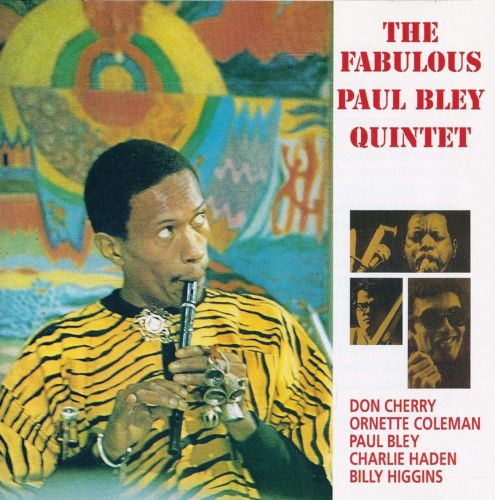Startseite › Foren › Über Bands, Solokünstler und Genres › Eine Frage des Stils › Blue Note – das Jazzforum › Ornette Coleman › Re: Ornette Coleman
An die elektrischen Aufnahmen nähere ich mich immer noch an – sehr langsam, aber sie gefallen mir immer besser.
Ansonsten, die Atlantic-Box ist grandios – ich hatte einige Alben davor einzeln und finde es klasse, die Aufnahmen komplett und am Stück zu hören (es gab ja drei LPs mit „Resten“, die in der Box bei den jeweiligen Sessions einsortiert sind). Haden entwickelt hier bereits sein Bass-Spiel, das – ich komme um den Vergleich nicht herum – so prägend für jede Gruppe ist, in der er auftaucht, wie es sonst wohl nur bei Mingus, vielleicht noch bei Wilbur Ware der Fall ist (ich lese – s.u. – gerade wieder, dass Haden Ware als grosses Vorbild betrachtete). Im Gegensatz zu Mingus wirkt das bei Haden aber immer äusserst bescheiden, es geht nicht um Egos sondern bloss um Dienst an der Musik.
Ornette und Cherry kann man wohl als eine Art „Update“ von Bird und Diz betrachten, wenn man mag – ihr beinah telepathisches Zusammenspiel ist jedenfalls ähnlich.
Ich habe mir gerade die Mühe gemacht, John Litweilers brillante Analyse ausgiebig zu exzerpieren – da das so umfangreich wurde, packe ich es der Lesbarkeit zuliebe nicht in kursive Zitat-Kästchen. Zwischen den Posts gibt es jeweils weitere Auslassungen im Text, alle anderen sind durch „[…]“ gekennzeichnet. Leerzeilen zwischen den Absätzen gibt es im Buch natürlich nicht, aber das das am Bildschirm die Lesbarkeit enorm erleichtert, habe ich sie eingefügt.

________________________
In February 1958 Ornette Coleman recorded Something Else!; his quintet included Don Cherry, trumpet, and Billy Higgins, drums. In the liner notes he offers the principle that motivates his music’s freedom of expression: „I think on day music will be alot freer. Then the pattern for a tune, for instance, will be forgotten and the tune itself will be the pattern, and won’t have to be forced into conventional patterns. The creation of music is just as natural as the air we breathe. I believe music is really a free thing, and any way you can enjoy it you should.“
Here is the Freedom principle. The era of Free jazz begins with this first document. Something Else! made little impact at first, and Coleman’s only musical gig the rest of the year was when he, Cherry, and Higgins played for six weeks with pianist Paul Bley (Coleman almost never again performed with a pianist). (S. 34)

[…]
Coleman’s alto soloing [auf den Aufnahmen von 1958] is shot through with the adrenaline of Charlie Parker, the aggression of Parker in blues such as „Alpha“ and two versions of „When Will the Blues Leave?“ His broken, irregular phrasing suggests the contours of early Parker or, in the first version of „Ramblin‘,“ a heretofore missing link between Charlie Christian and Parker; the exultant, leaping phrases and the undercurrent of loneliness in his sound fill a thirteen chorus blues solo, a summary and summit of southwestern style. In every solo, Coleman plays phrases that turn around the beat, or accents fall asymmetrically, or phrases are spaced so that they begin irregularly within bars; this rhythmic acuteness leads to an ever-present sense of danger, of disguised, coiled accents striking at arteries. Coleman’s essentially diatonic phrases also become tense with ancular intervals, and his shifting tonalities add yet more tension with their apparent harmonic irresolution. In solos such as „Klactoveedsedstene“ the sound of his alto moves, from phrase to phrase at times and sometimes even within phrases. (S. 34f.)

________________________
aus: John Litweiler, The Freedom Principle: Jazz After 1958, New York, 1984, Chapter 2: Ornette Coleman: The Birth of Freedom, S. 31-58
--
"Don't play what the public want. You play what you want and let the public pick up on what you doin' -- even if it take them fifteen, twenty years." (Thelonious Monk) | Meine Sendungen auf Radio StoneFM: gypsy goes jazz, #169: Pianistinnen im Trio, 1984–1993 – 13.01.2026, 22:00: #170 – 19.02.2026, 20:00; #171 – 10.03.2026, 22:00; #172 – 14.04.2026, 22:00 | Slow Drive to South Africa, #8: tba | No Problem Saloon, #30: tba